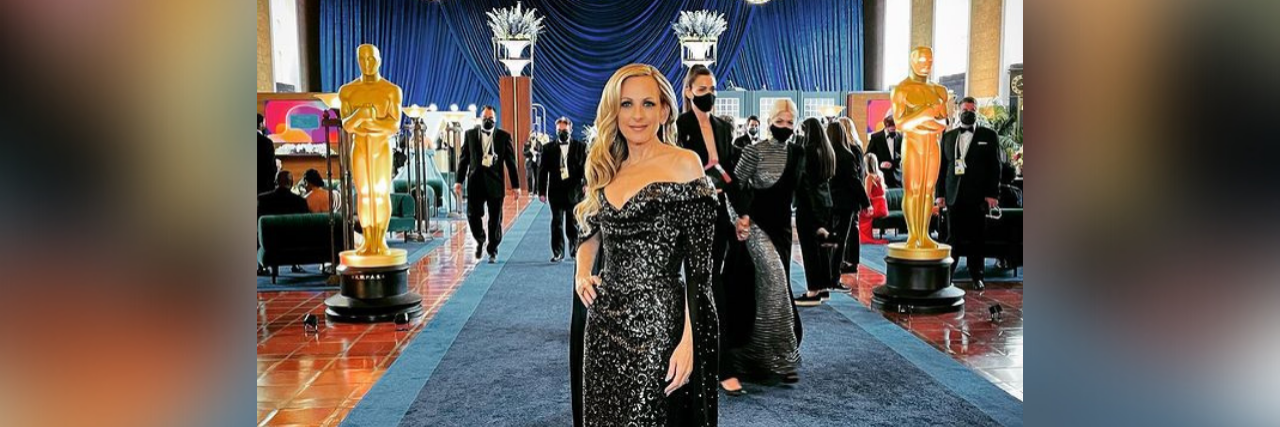At the 2021 Academy Awards, Marlee Matlin, the youngest actress to ever win an Oscar in the Best Actress category, and the only deaf person to ever win an Oscar, was invited to present the 2021 Best Documentary Short Subject and Best Documentary Feature — in sign language.
However, when Matlin was supposed to present the Oscar awards, the much-anticipated rare moment was cut out when the camera panned away and left us with only the interpreter’s voiced narration.
This inaccessible decision rightfully sparked anger and disappointment, including from countless Twitter users who called on the Oscars to rethink this decision. Yet again, we have an instance where only non-disabled people are provided with accessibility.
One Tweet from @JordanRBerger reads, “Crip Camp losing was not surprising given that minutes before cameras cut away from a signing Marlee Matlin while she was mid-sentence. Just another reminder of how the Academy devalues disabled voices. #CrippingTheRedCarpet #OscarsDISs”
Crip Camp losing was not surprising given that minutes before cameras cut away from a signing Marlee Matlin while she was mid sentence. Just another reminder of how the Academy devalues disabled voices. #CrippingTheRedCarpet #OscarsDISs
— Jordan Berger (@JordanRBerger) April 26, 2021
As an improvement, the broadcast did include live captioning. Yet, it is important to understand that captioning does not replace sign language. American Sign Language (ASL) is a complete, complex visual-spatial language that differs from English in its grammatical structures and syntax. Until captioning and ASL are built directly into all broadcasts with a split or reduced screen, we do not have true inclusivity for the deaf and hard of hearing community.
As someone who lives with auditory disabilities, this Oscar presentation sparked similar feelings in me compared to when I watched “A Quiet Place,” a 2018 post-apocalyptic film presented almost entirely in sign language. The signs were captioned throughout the film and turned off only when the actors used verbal speech. In both examples, only non-disabled hearing people were provided with accessibility.
Accessibility is not hard to provide, and these examples are more than a simple oversight. It is a loud message that declares certain types of people are not anticipated, considered or welcomed in certain spaces. It is a loud message that demonstrates people selectively decide what they do and do not make accessible.
The Academy Awards has been the recipient of repeated grievances from the disability community. In addition to panning away from Matlin, they have never provided an ASL interpreter. Finally, this year, they had a ramp for the first time leading up to the stage. While this is noteworthy, I have mixed feelings. It is disconcerting that the first ramp to be provided at a major awards ceremony has only just happened in 2021.
These examples hardly scratch the surface of the inaccessibility disabled people encounter every day. They are not isolated incidents. Non-disabled people need to recognize these daily barriers in our society that they uphold.
For example, in 2019, disabled actress Ali Stroker won a Tony Award for Best Featured Actress in a Musical. Because there was no ramp from the audience to the stage, Stroker was unable to sit with her peers and was forced to wait backstage in case she won the award. Later, the cast won a Tony for Best Revival of a Musical. She was unable to join the rest of the cast on stage.
Albeit maybe not an intentional decision to exclude disabled people, inaccessibility is a choice that still has major consequences. Our culture has prioritized and considered only non-disabled people as the default when it comes to accessible spaces, services, education and more. Our culture considers inaccessibility the norm, and that is no accident, especially when disabled people continue to advocate. Simple pleasures like TV shows or fun events that non-disabled people take for granted may be inaccessible to disabled people.
There were considerable improvements at the Academy Awards this year, including live captioning, the historic accessible stage and several movies featuring disabled people were nominated. This year shined a light on disability. But I cannot help but think that we do not need to “give thanks” for accessibility. It is a human right. It is something we are owed as part of society.
While I believe the changes are here to stay, unfortunately, accessibility is often inconsistent. We need these changes to remain and to implement further improvements, including interpreters. We must normalize and integrate accessibility into our culture.
View this post on Instagram
Image via Instagram/Marlee Matlin.

